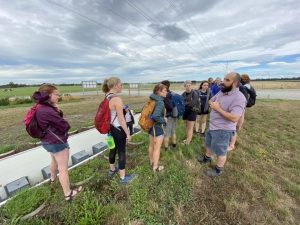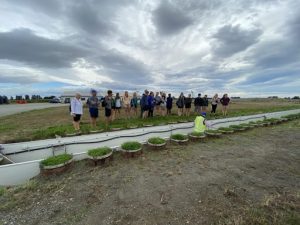Hi everyone! Although we got sent home from the trip early, it was amazing while it lasted. One of the most memorable experiences for me was when we had lectures on the New Zealand dairy industry with researchers from Lincoln University. I had always thought that the dairy industry was fairly simple, where you just let cows out into the pasture and then bring them in every day to milk them.
However, the process towards making the dairy industry more sustainable is a much more complicated process than I thought. According to Dr. Omar Al- Marashdeh, the main goal of the research being done is to “find ways to reduce environmental impact while maintaining profits”. One of New Zealand’s main exports is dairy products, so the research being done has a very large impact on its economy.  While at the research center we were given a lecture on the research being done, and then were taken out on a tour of the fields. For example, the researchers had found that the ideal ratio of pasture is 80% perennial ryegrass and 20% white clover. This ratio both gives the cows the nutrients that are needed while also fixating large amounts of nitrogen. They also taught us about some interesting ideas that did not work out so well, such as having a plastic sheet that is attached to the underside of the cows in order to spray their pee and decrease the concentration of nitrogen in their urine patches. They also discussed with us how dairy farmers are expected to reduce nitrogen output and how this will be regulated. After this busy day at the research center, we had a discussion on the bus ride back to the hostel about our thoughts on the dairy industry.
While at the research center we were given a lecture on the research being done, and then were taken out on a tour of the fields. For example, the researchers had found that the ideal ratio of pasture is 80% perennial ryegrass and 20% white clover. This ratio both gives the cows the nutrients that are needed while also fixating large amounts of nitrogen. They also taught us about some interesting ideas that did not work out so well, such as having a plastic sheet that is attached to the underside of the cows in order to spray their pee and decrease the concentration of nitrogen in their urine patches. They also discussed with us how dairy farmers are expected to reduce nitrogen output and how this will be regulated. After this busy day at the research center, we had a discussion on the bus ride back to the hostel about our thoughts on the dairy industry.  What made this day so important for me is that it encouraged me to think more deeply about what I considered to be a simple and straightforward industry. It has encouraged me to think deeper about environmental problems, and how compromises sometimes have to be made in order to satisfy profit goals or allow people to keep their jobs. Overall, I have learned how environmental issues might be more complicated than they first look.
What made this day so important for me is that it encouraged me to think more deeply about what I considered to be a simple and straightforward industry. It has encouraged me to think deeper about environmental problems, and how compromises sometimes have to be made in order to satisfy profit goals or allow people to keep their jobs. Overall, I have learned how environmental issues might be more complicated than they first look.
-Sam